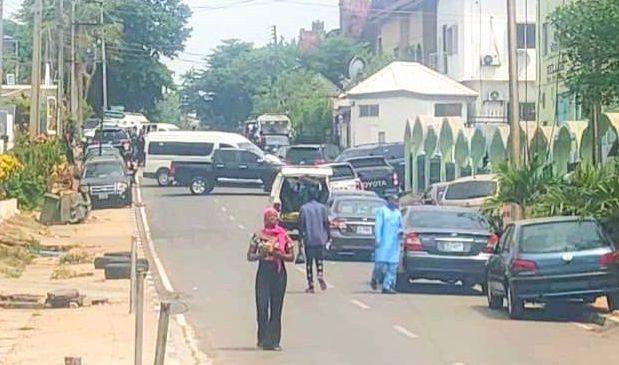EFCC Presence at Yahaya Bello’s Abuja Home Sparks Controversy. In a dramatic turn of events, operatives from the Economic and Financial Crimes Commission (EFCC) recently conducted a raid on the Abuja residence of Yahaya Bello, the former Governor of Kogi State. The scene unfolded in Wuse Zone 4, within the Federal Capital Territory, where armed EFCC personnel were seen surrounding the ex-governor’s home on Benghazi Street.

As of the latest reports, the motive behind this operation remains unconfirmed. Despite efforts to obtain clarity from the EFCC spokesperson, Dele Oyewale, no official statement has been released regarding the nature of the siege.
This incident follows the EFCC’s amended charge against Yahaya Bello, his nephew Ali, Dauda Sulaiman, and Abdulsalam Hudu, presented before Justice James Omotosho of the Federal High Court in Abuja. The charge, issued in March 2024, pertains to an alleged N84 billion money laundering scheme.
Yahaya Bello, Ex-Governor’s Response and Legal Standoff
Reacting to the presence of EFCC operatives at his residence, Yahaya Bello’s media office issued a statement condemning the action. The statement raised concerns over the disregard for a court injunction issued by the High Court of Justice, Lokoja Division. This injunction, granted on February 9, 2024, restrained the EFCC from harassing, arresting, detaining, or prosecuting Bello pending the outcome of a fundamental rights enforcement action.
According to the statement, despite being served with the court order on February 12, 2024, the EFCC proceeded to file an appeal against it. The appeal, accompanied by a Motion for Stay of Execution, was scheduled for hearing on April 22, 2024. The media office criticized the EFCC for disregarding legal protocols and engaging in actions that contradict judicial directives.
The statement further highlighted the imminent judgment in the substantive case between Bello and the EFCC, scheduled to be delivered in Lokoja. It expressed dismay over the EFCC’s decision to besiege Bello’s residence, alleging a blatant violation of existing court orders.

Allegations and Counterclaims
In response to the EFCC’s accusations, Bello’s media office dismissed the charges as part of a concerted effort to tarnish his reputation. It claimed that the anti-graft agency was attempting to harass him with baseless allegations, including those dating back to September 2015.
The amended charge, comprising 17 counts, accuses Bello of money laundering, breach of trust, and misappropriation of funds totaling N84,062,406,089.88. Despite the seriousness of these allegations, the former governor’s whereabouts remain unknown, as stated by the EFCC.
Kogi State Government’s Position
Meanwhile, the Kogi State Government has vehemently opposed the EFCC’s charges against Bello. In a statement released by the Commissioner for Information and Communications, Kingsley Fanwo, the government labeled the accusations as “ridiculous” and “laughable.” It emphasized the impossibility of Bello accessing or misappropriating state funds during the period in question.
Furthermore, the government criticized the EFCC for deviating from its mandate and accused certain individuals within the agency of pursuing personal agendas. This sentiment reflects broader concerns about the agency’s integrity and its commitment to combating corruption effectively.
Legal Proceedings and Ongoing Investigations
Despite the legal complexities surrounding this case, Yahaya Bello’s legal team remains steadfast in their defense. With the impending judgment and the appellate process underway, the resolution of this matter is eagerly anticipated.
As the controversy unfolds, it underscores the challenges inherent in addressing corruption allegations within Nigeria’s political landscape. The outcome of this case will undoubtedly have far-reaching implications for the country’s legal system and its ongoing efforts to combat financial malpractice.
Read also:
- Hajia Bintu Flaunts Her Natural Beauty in a Vibrant Two-Piece Swimsuit
- Cement Price Drops as Dangote, BUA, Lafrage and Others Offer Relief from Soaring Costs
- Portable Begs EFCC not to arrest him for abusing the naira
- Cubana Chief Priest granted ₦10m bail, pleads not guilty to naira abuse charges
- Dealers Slash Cooking Gas Prices to N1,100 Per Kg Amid Stronger Naira
- EFCC Investigating Celebrities for Naira Abuse
- Mark Zuckerberg Unveils Exciting WhatsApp Chat Filter Update
- Reps committee give SEC 21 days to reconcile ₦45 billion unremitted funds
- Tiwa Savage on Her New Film “Water and Garri” as a ‘boss lady’
- NECO Postpones Common Entrance Exam Due to Low Enrollment
- Embarrassed Law Graduate lady Reconciles With Pastor Paul Enenche
- First AI Women beauty pageant



